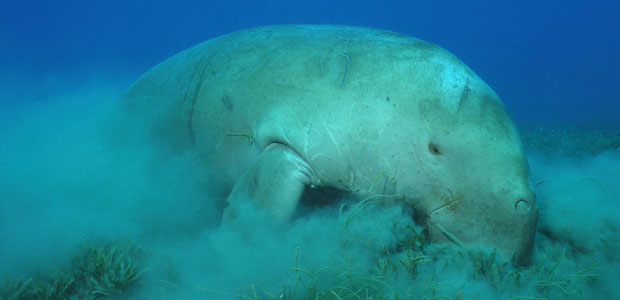Advertisement
Wildlife Wednesday: Dugong
It’s a mermaid! It’s a sea cow! It’s a … dugong? This Wildlife Wednesday, learn about the highly threatened dugong—a type of sea cow very similar to a manatee. Habitat: the shallow, warm, tropical waters from off East Africa to Australia (including the Red Sea, Indian Ocean, and Pacific Ocean) Dugong trivia Dugongs are large … Continued

It’s a mermaid! It’s a sea cow! It’s a … dugong? This Wildlife Wednesday, learn about the highly threatened dugong—a type of sea cow very similar to a manatee.
Habitat: the shallow, warm, tropical waters from off East Africa to Australia (including the Red Sea, Indian Ocean, and Pacific Ocean)
Dugong trivia
- Dugongs are large underwater herbivore mammals. Dugongs and manatees are very similar, except for the fact that dugongs have fluked tails like whales.
- It’s hypothesized that dugongs may be the explanation for sailors’ tales of mermaids, and the name “sea cow” comes from their habit of grazing along the bottom of the ocean for grasses and aquatic plants. But dugongs are actually closely related to elephants, not cows or whales and dolphins (or mermaids, for that matter!).
- These days, only one species of sea cow lives in each world region, but fossil records indicate that once upon a time, multiple species coexisted.
- Female dugongs remain pregnant with their calves for an entire year, and babies stay with their mothers for a year and a half.
- Dugongs are very graceful swimmers, and have excellent hearing but very poor eyesight.
- They live for up to 70 years and weigh up to 1,000 pounds.
Why they’re threatened and how to help
Dugongs are highly threatened. According to the World Wildlife Foundation (WWF), there are fewer than 150 of them left in the waters around Africa.
Although there is protective legislature in place, dugongs are slow moving and are at risk from being struck and killed by boats, and being caught in fishing nets and marine debris. They are further threatened by declining water quality, and habitat loss such as from marinas. Learn more about water quality and what you can do to reduce marine debris in your day-to-day life.





